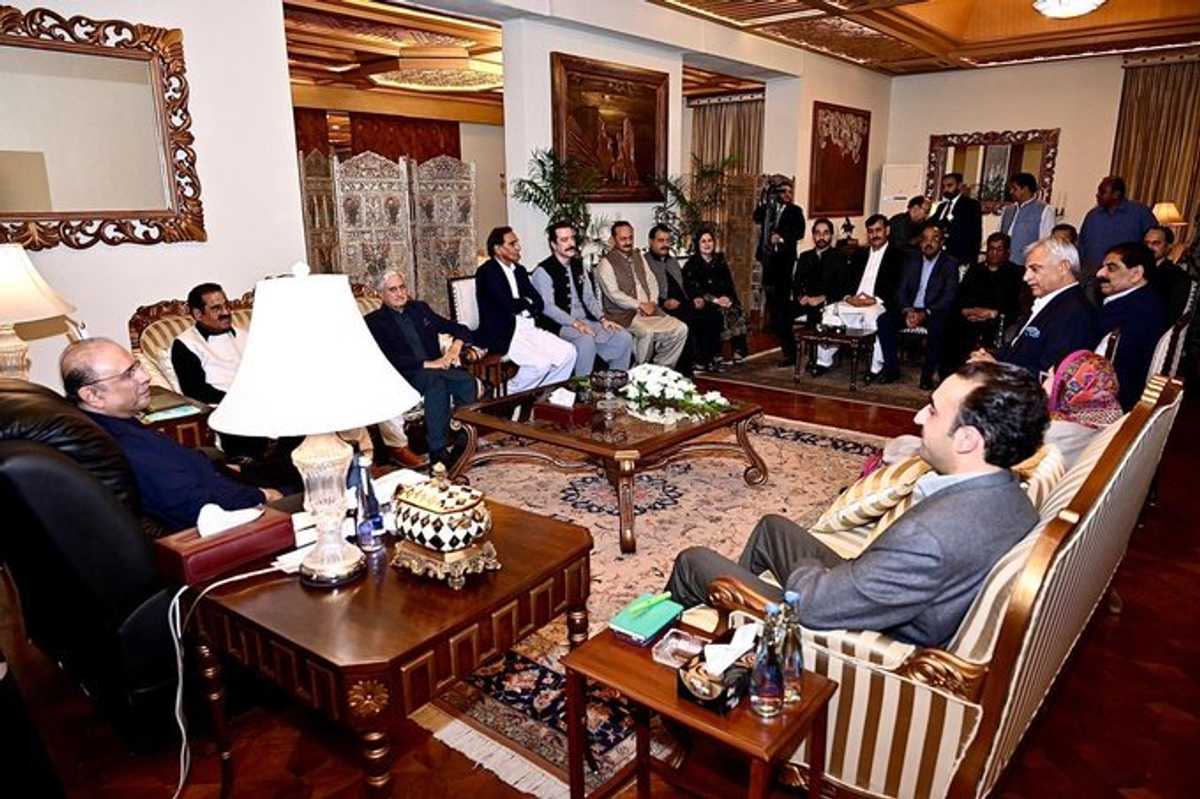Key coalition party claims majority to form govt in Pakistan-administered Kashmir
President Zardari reportedly contacted PM Shehbaz Sharif to seek federal backing for PPP’s bid

Javed Hussain
Correspondent
I have almost 20 years of experience in print, radio, and TV media. I started my career with "Daily Jang" after which I got the opportunity to work in FM 103, Radio Pakistan, News One, Ab Tak News, Dawn News TV, Dunya News, 92 News and regional channels Rohi TV, Apna Channel and Sach TV where I worked and gained experience in different areas of all three mediums. My journey from reporting to news anchor in these organisations was excellent. Now, I am working as a correspondent with Nukta in Islamabad, where I get the opportunity of in-depth journalism and storytelling while I am now covering parliamentary affairs, politics, and technology.

President Asif Ali Zardari chairs Pakistan-administered Kashmir's parliamentary committee meeting at President House, Islamabad, October 25, 2025.
Courtesy: X/@MediaCellPPP
The political landscape in Pakistan-administered Kashmir is witnessing major developments as the Pakistan Peoples Party (PPP) — a major ruling coalition party in Pakistan — claims to have secured the required 27 members needed to form a government.
Senior PPP leader Faryal Talpur hosted a pivotal dinner at Sindh House, Islamabad, attended by 27 assembly members. The gathering confirmed the party’s parliamentary strength and reinforced its path toward government formation.
Pakistan-administered Jammu and Kashmir, known locally as Azad Jammu and Kashmir (AJK), has its own legislative assembly and prime minister but remains under the administrative control of Islamabad. Political developments there often mirror shifts in Pakistan’s federal politics.
According to party sources, President Asif Ali Zardari contacted Prime Minister Muhammad Shehbaz Sharif to seek federal support for the PPP’s bid to form the government. Following the call, the prime minister reportedly formed a committee led by Federal Minister Ahsan Iqbal to review the situation and decide whether to back the PPP.
However, the Pakistan Muslim League-N (PML-N) — the other major coalition partner — has taken a clear stance on the issue. Shah Ghulam Qadir, president of PML-N in Pakistan-administered Kashmir, stated that the party will not participate in government formation and will sit in opposition to protect the rights of the people.
He emphasized that a unanimous decision was made in the PML-N parliamentary party meeting and that the party will play a full and constructive role from the opposition benches.
Despite PML-N’s refusal, PPP is reportedly seeking cooperation from forward bloc members — a splinter group of lawmakers —and other independents to secure the required majority.
PPP spokesperson Sardar Tanveer Ilyas reiterated that the party enjoys a clear majority and that all final decisions regarding the new assembly leader will be made by party chairman Bilawal Bhutto-Zardari.
The PPP also warned that if Prime Minister Chaudhry Anwarul Haq does not resign within the stipulated timeframe, a no-confidence motion will be submitted.
Party leaders said a resignation on Black Day, October 27 (today), would send a positive message to the Kashmiri people and uphold democratic values.
With PPP consolidating the so-called “golden 27” majority and PML-N firmly in opposition, the political scenario in Pakistan-administered Jammu & Kashmir is entering a critical phase that will determine the leadership and direction of the region’s government.
What's the issue?
In Pakistan-administered Jammu and Kashmir, political developments have taken a significant turn as PPP decided to part ways with the ruling coalition government, citing deepening differences and disregard for its input in key administrative decisions.
The PPP, claiming to be the region’s largest parliamentary force, has expressed its intention to form its own government.
The move comes amid growing public dissatisfaction over governance issues, transparency concerns, and new laws curbing criticism of the government — all of which have intensified political tensions.
Observers believe these shifts could pave the way for a major realignment in the region’s political landscape in the coming days.







Comments
See what people are discussing